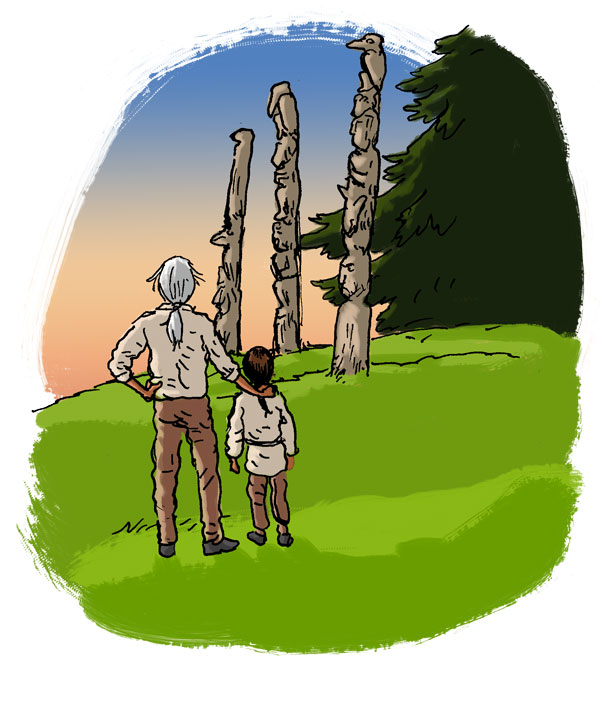Section 2.5 Halq'eméylem - SKWI’IKWEXAM QES TE WET’OT’E SLEXWELH
Written by: Veselin Jungic and Mark MacLean
Illustrated by: Simon Roy
Halq'eméylem translation by: Siyamiyateliyot, Kwelaxtelot, and Kwosel, Seabird Island First Nation
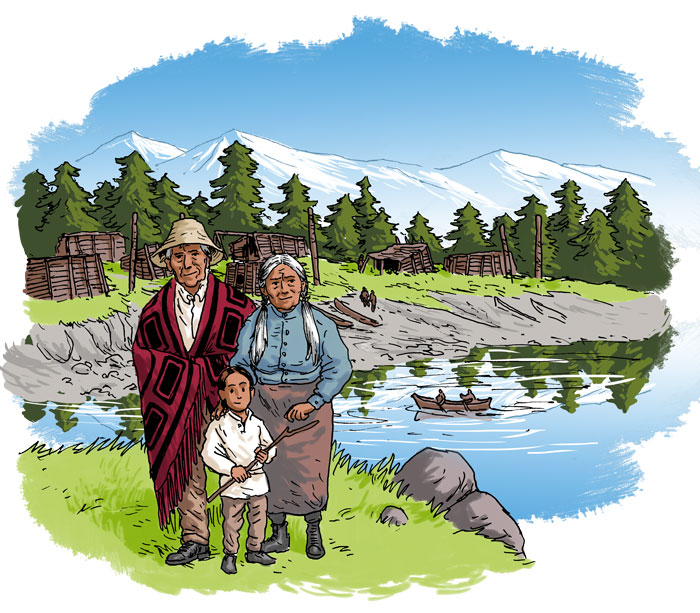
Lheq’átses máqe swiqóllh te Skw’íkw’exàm, weyó:th kw’es ólsu qwélqwel. Sta: sq’o te sísles qaste sílas, kwa weyóth éwes ts’iwélmetem te láts’e skwóyxthets tútl’ò. Loy kw’esu hihóytes tl’e síla te sxet’kw’áls stl’etl’áxel lóthel tlowáyel. Iyólem kw’es las kw’e satl’q ewólemstexwes ye si:yá:yes te Skw’íkw’exàm. Yu:w te swíwel, temqw’íles swáyel, qesu xwalxálems ye swowiqe’óllh stetís te qo, kw’es ewólems.
Small Number is a five year-old boy who gets into a lot of mischief. He lives with his Grandma and Grandpa, who patiently put up with his antics most of the time. Today, Grandpa needs to finish carving a feast dish and decides that Small Number should go out and play with his friends.
Me:kw’ stam kw’étslexwes tútl’òlem qesu thetíwel lá kw’e xaws sewólem qe kwa te siyáyes te Skw’íkw’exám, Stitlákw’e, thet: “Tewát iyólem lemélstexw kw’e semlát ts’éts’el chokw sts’ets’tl’ímlexw schelhólwelh te qo?” Kw’e xwem télexwes ye swowiqe’óllh kw’es las xwa chokws te semlát lo::y kw’esu yelxws, sp’ípe’elhs qesu tu stítelákw’e’òmexs.
It is a beautiful, sunny, spring day, and the boys run down to play near the water. Everything they see sparks a new game, and Small Number’s friend Big Circle suggests they see who can make a stone skip the farthest on the surface of the water. The boys quickly learn that for a stone to go far it needs to be smooth, flat, and oval shaped.
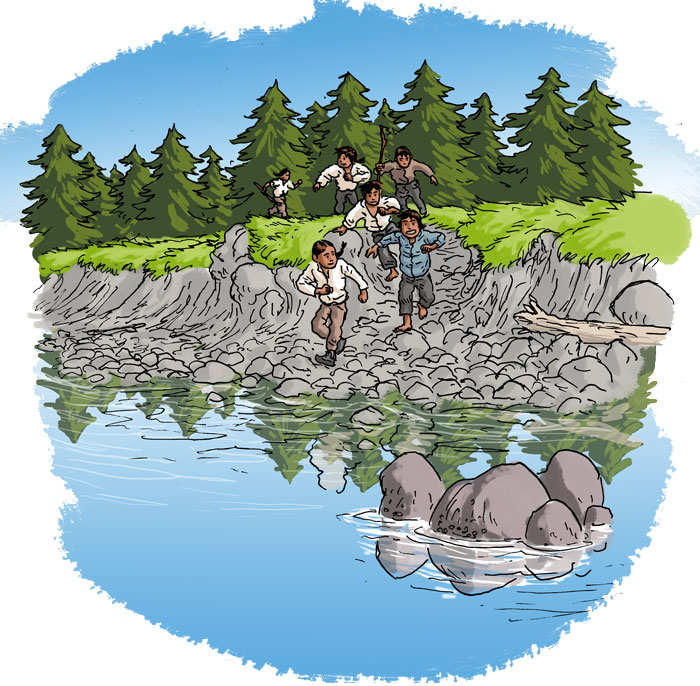
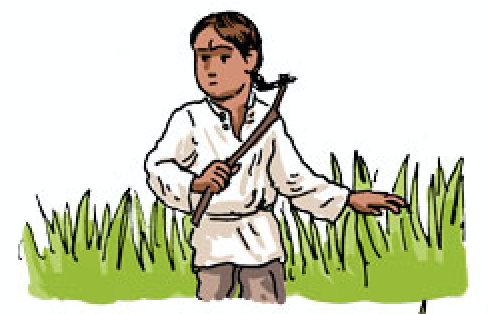
La shxwhélems la xwa chokw lhe’á te íyelth te Skw’íkw’exàm sawq’ kw’e stl’exwéleq semlát.
Small Number wanders far along the shore looking for a winning stone.
S’owth lhe’á te tl’áleqt sóxwel qesu lhékw’xel tselhólwelh kw’e stam, kw’ets’líqwem la te wet’ót’ sléxwelh skwókwelt li te sóxwel.
He scrambles through tall grass and trips over something, falling headfirst into an old canoe hidden in the grass.
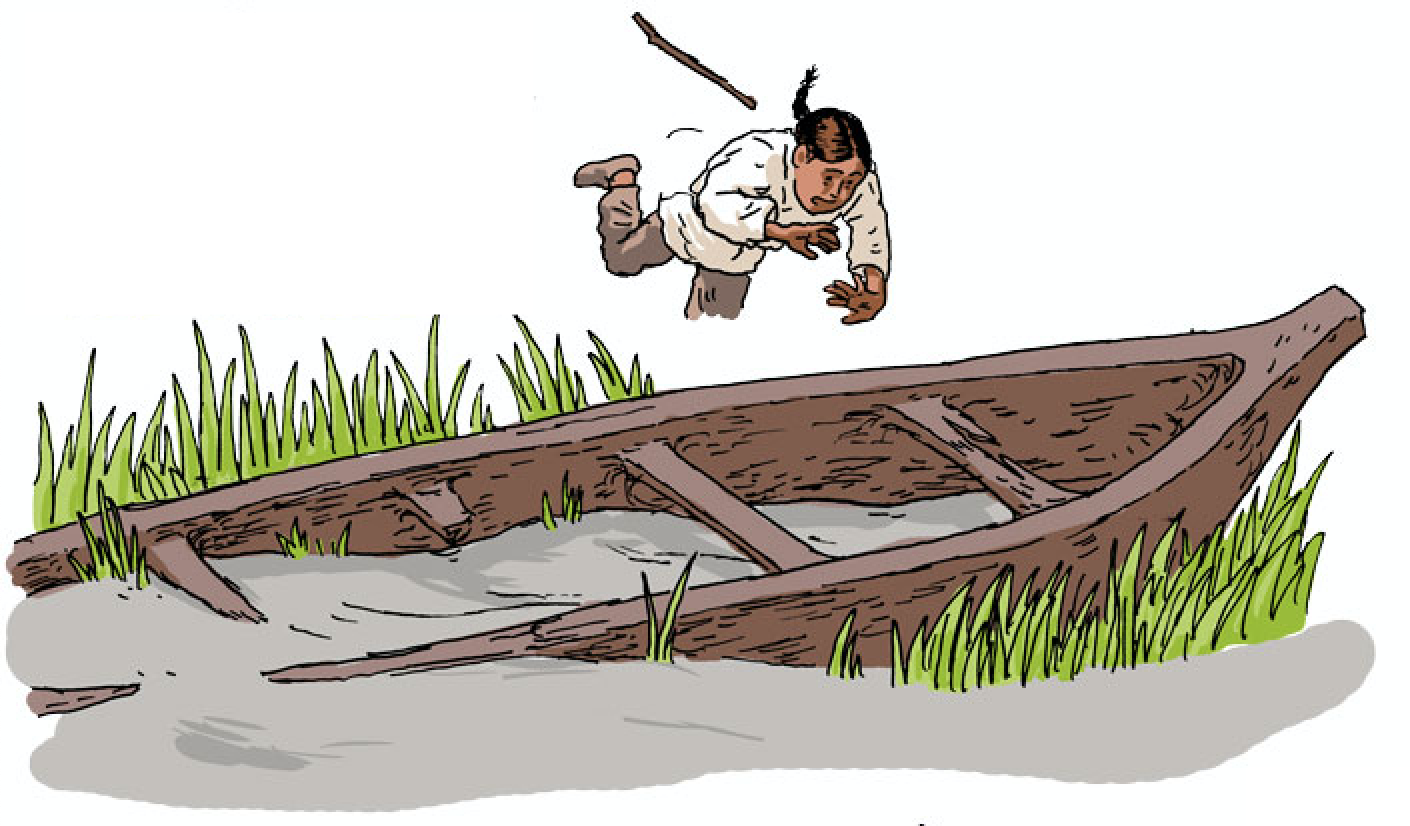
Xwílex te Skw'íkw’exàm, yóyetl’etes te sqw’émels kw’eses kw’ókw’etstes selts’ te sléxwelh. Lu sá:yemstexwes te sxóyes tútl’ò, qe lu ts’óyexwèm xwelá te thexláxwes qesu támetes ye si:yáyes, emi ye xwómxelem tútl’òlem.
Small Number stands up, rubbing his forehead as he looks around at the canoe. Even though his head hurts, he is very excited at his discovery and he calls out to his friends, who come running.
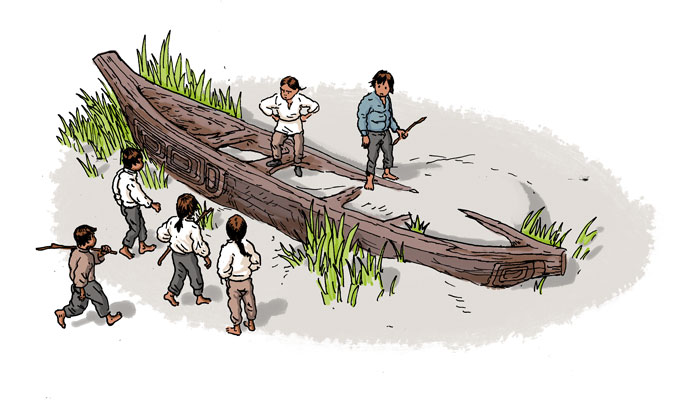
Lhexlhexéylex ye swowiqóllh selts’ te sléxwelh qátxtes te shxwe’ólesòmexs. Ste’ó:mex kwes olu wet’ót qesu hi::kw xwelá tútl’òlem. Petám te Skw’íkw’exàm “Kw’elála mestíyexw kw’es xet’e iyólem el’elólh?”
The boys stand around the canoe, running their hands along its smooth shape. It looks very old and very big to them. Small Number asks, “How many people do you think it could hold?”
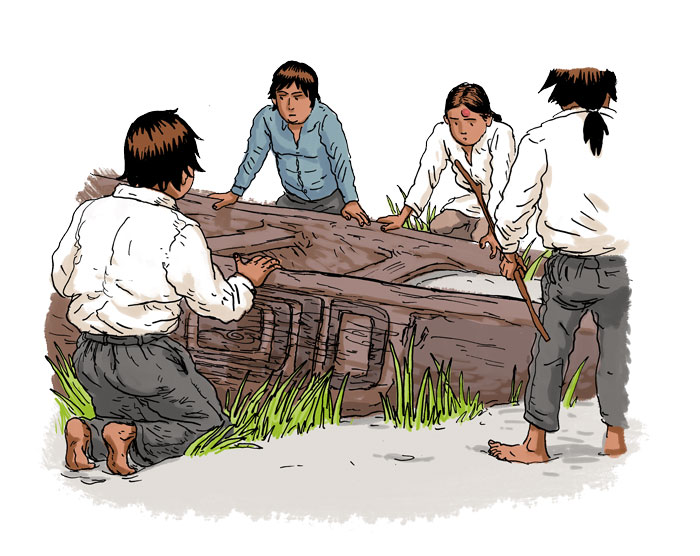
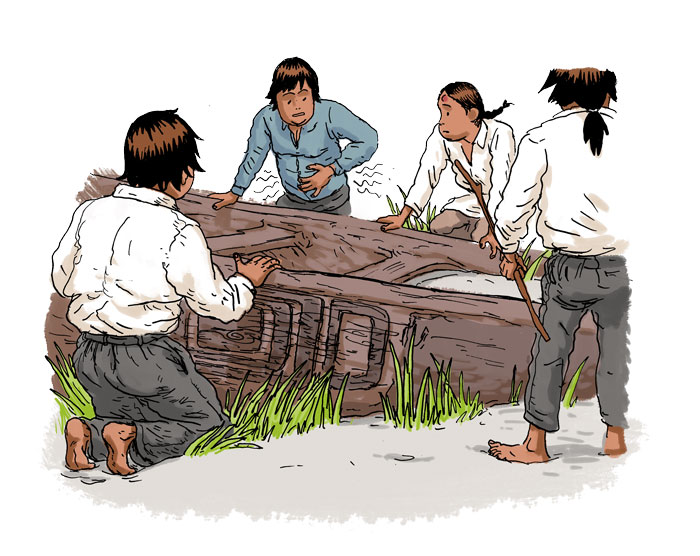
Petám te Stitelákw’ “Kw’il yexw sq’eq’ótel te lulh la yeláw kwéselh hà:y kw’ewátes?” Mélqlexwes ye swowiqóllh te ilh siwólems qesu hi:th kwes qwoqwéleses xwelá te sléxwelh qas tewát yexw kw’e ilh hekwhókwex te sléxwelh.
Big Circle asks, “How many generations ago was it built?” The boys forget their previous game and spend a long time talking about the canoe and who might have used it.
Kwéselh ye qwóqwel yútl’òlem, iyóthet qw’óyexwem te kw’éles te Stitelákw’ “Tsel qw’ay, xwemtl’ la élhtel” thétstexwes ye si:yá:yes tútl’ò. Ye ew swowiqe’óllh télexw kweses ew kw’ólekw’i qesu me:kw’ la xwalxálem la te st’elt’eláwtexw.
As they are talking, Big Circle’s tummy starts to growl. “I’m hungry. Let’s go eat,” he says to his friends. The other boys realize they are hungry too, and they all run back to the village.
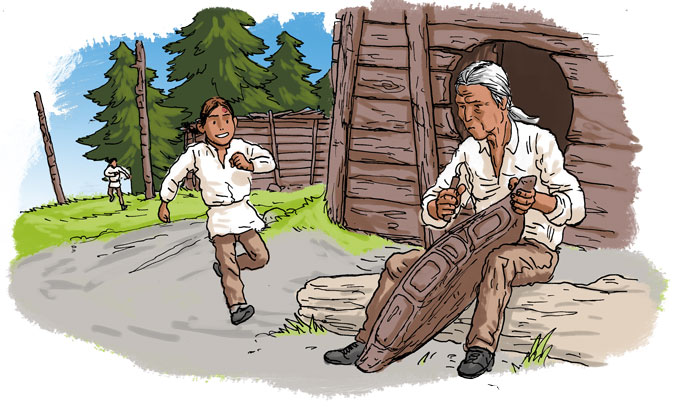
?éwéltil xwe t’ót’ekw’ te Skw’íkw’exàm shxwelís kw’es xát’kw’els te síla stslhítsels te tá’al kw’es hikws syolh lóthel. Lexw sthíqel te Skw’íkw’exàm sts’óyxwemqel qesu xwepósem te síla. Kw’étslexwes te st’ít’eqel lite sqw’émels te Skw’íkw’exàm. Petá:m te síla “Chexw xwe’ít?” Mélqlexwes te Skw’íkw’exàm kwes qw’eqw’éleqw tútl’ò qesu iyóthet yéthestes te síla xwelá te thexláxwes te sléxwelh. “Tsel thexláxw te wet’ót’ sléxwelh lite íyelth. Tselíl qe ulh léts’e láts’wets syilólem.”
Small Number races home, where Grandpa is carving the surface of a huge wooden dish. Small Number is shouting excitedly and Grandpa looks up. He sees the bruise on Small Number’s forehead. “What happened?!” Grandpa asks. Small Number has forgotten that he bumped his head and starts to tell Grandpa about finding the canoe, “I found an old canoe down on the beach! It must be at least a hundred years old!”
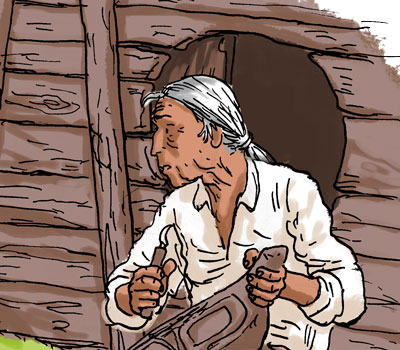
Xwelíyemes te síla. “Tsel lheq’élexw tetha sléxwelh. Lets’áxw kwéselh tl’o ólu xwemxwém tetha sléxwelh ite s’ólh st’elt’eláwtexw. Ilh tl’o tel málelh qas te yáysela álexs e’ hà:y te sléxwelh.”
Grandpa smiles. “I know that canoe. It was once the fastest canoe in our village. It was built by my father and two of his brothers.”
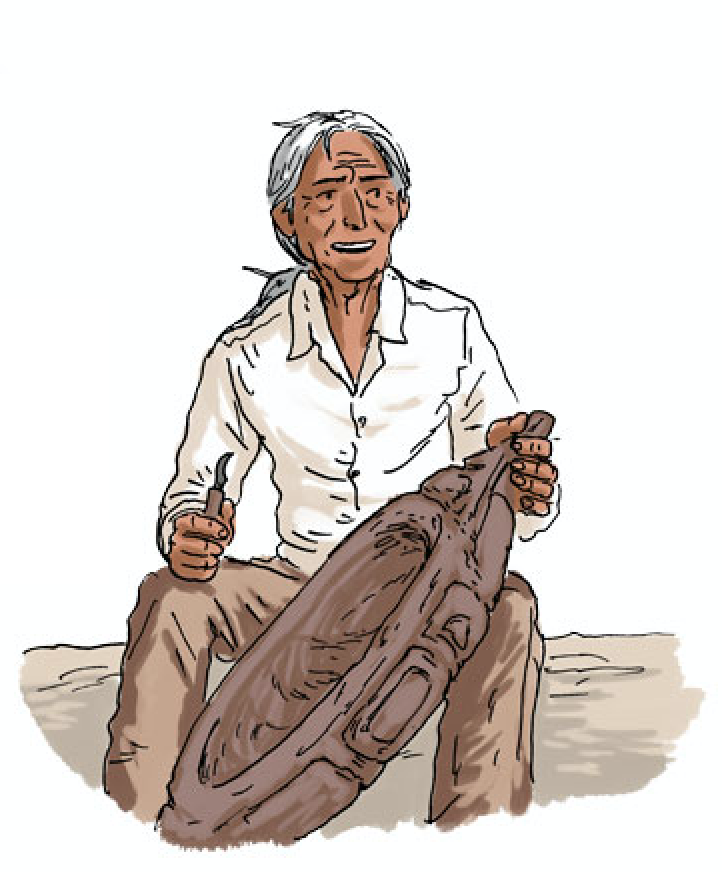
E’ ye’éy te síla sqwelwélmethets, “Me:kw’ te mámeles tel síla’elh lheq’élem kw’es schewétmetes kw’es xét’kw’als kw’e syolh”.
Grandpa proudly continues, “All the sons of my grandfather were known as great wood carvers.”
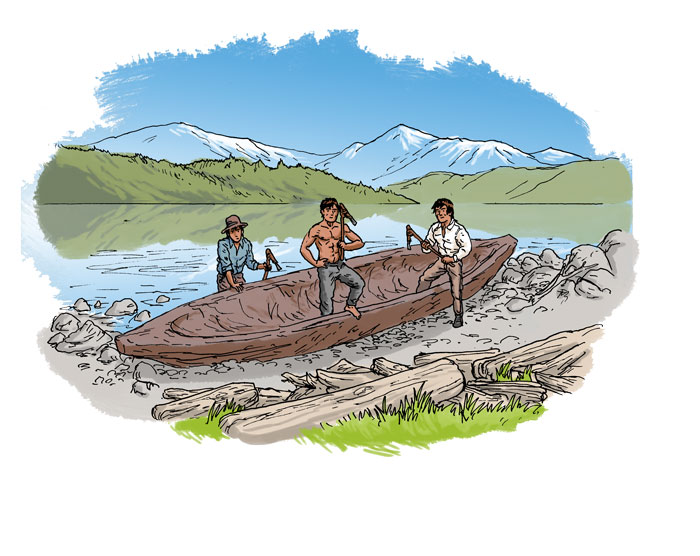
“Chexw lheq’élexw te lhexlhexéyelex slóqwleqw sxwíthi exelésmels te Smìlhe’áwtexw? Sléts’lets’e tl’o sxét’kw’als yel shxwemlálekw.”
“You know those three old totem poles in front of the longhouse? Each of them was built by one of my uncles.”
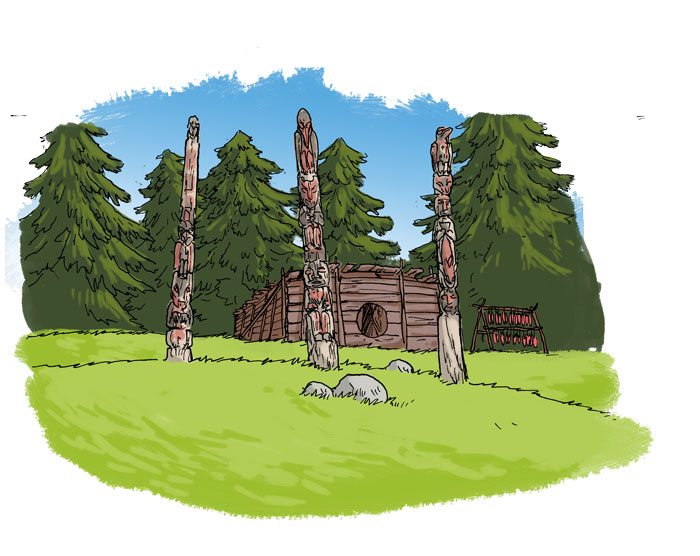
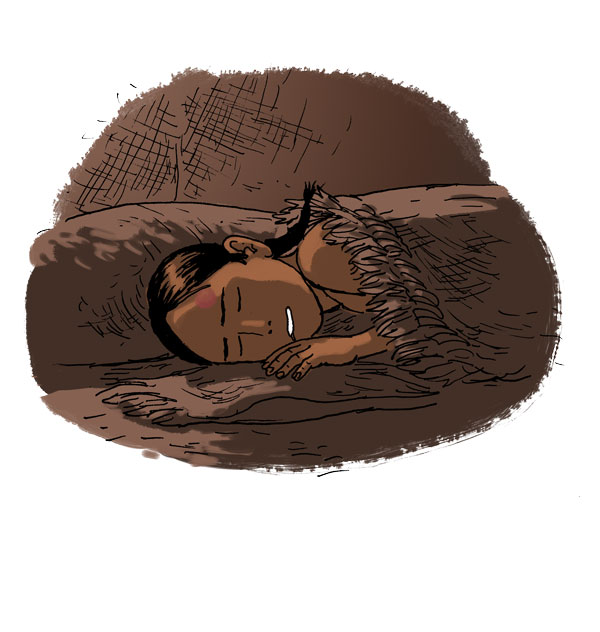
Tetha xwelált xwel xwewá lis ítet e’ thetíwel te Skw’íkw’exàm, “el stl’i kw’els hà:y kw’e sléxwelh q’elsu xet’kw’áls kw’e slóleqw ste’á yel siwálelh. Tsel cha petámet te síla lis kw’elála elálexs te ma:ls: yáysela, lhexwále, xethíle, lheq’átsesàle, qew lis ew qelát ò”.
That evening, just before falling asleep, Small Number thought, “I'd like to build canoes and totem poles just like my ancestors. I have to ask Grandpa tomorrow how many brothers his father had. Two, three, four, five or more…”
Speta:m Selchím kwes ste’áwel te Skw’íkw’exàm kwes la kw’elála te elálexs te sth’ómeqws.
Question: Why did Small Number think that his great-grandpa might have two, three, four, five or more brothers?
